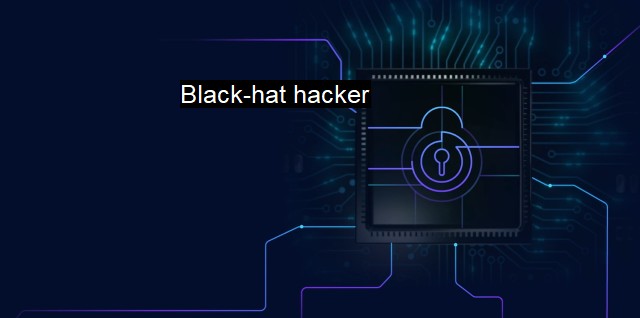What is Black-hat hacker?
Exploring the Shadowy World of Black-Hat Hackers: Techniques, Motivations, and Threats
In the digitally interconnected realm of cybersecurity, one might often hear words like white-hat, grey-hat, or black-hat hackers. Among the dark and deadly warriors in the cyber world, black-hat hackers pose significant threats to both cybersecurity and antivirus safety measures. Similar to its namesake villain from old western film tropes, a black-hat hacker operates outside the law, using sophisticated hacking tactics for personal gain or pure malicious intent.A black-hat hacker is an individual who possesses the extensive technical knowledge needed to infiltrate a secure computer system or network without authorization. The illicit activities of black-hat hackers range from stealing data, modifying system configurations, distributing malware to intentionally causing harm and disrupt critical services. Unlike their white-hat counterparts, they don't use their hacking skills for ethical purposes or enhancing cybersecurity measures, but rather engage in deviant acts causing severe damage online.
Black-hat hackers malicious actions are typically driven by a variety of motivations. In some cases, their actions could be motivated by financial gain. This is often seen in instances of ransomware attacks, where the hackers hold the infected system hostage till a ransom is paid. As an example, the infamous "Wannacry" ransomware attack by black-hat hackers caused havoc around the world, encrypting data and demanding ransom in Bitcoin.
Another common motivation for black-hat hackers is the desire for recognition within their hacker community. They achieve notoriety by causing as much chaos as possible, disrupting systems or services, or infiltrating highly secure networks. Sometimes, they even aim to demonstrate and exploit the vulnerabilities of a system to prove its inefficiency.
Political motivation is another fuel driving black-hat hackers. They often indulge in cyber warfare or espionage to destabilize a government or an organization. The attacks can often be strategically designed to disrupt and manipulate the online presence and digital infrastructure of their targets for political gain, thereby inducing a state of chaos and uncertainty.
These individuals often exploit system and software vulnerabilities that exist in both outdated and current systems. They use tools and methods such as phishing attacks, SQL injections, virus and malware delivery, where traditional antiviruses can prove ineffective.
It's imperative that cybersecurity measures evolve consistently to keep pace with these evolving threats. Antivirus software, for instance, must be frequently updated to recognize and protect against new strains of viruses and malware. Organizations must also cultivate a robust security culture that emphasizes regular system updates, password hygiene, and awareness of phishing attacks, which are favored techniques of black-hat hackers.
The defensive mechanisms in the field of cybersecurity are continually locked in an escalating race against black-hat hackers, who consistently improve their cunning methods of infiltration. Therefore, it's not enough just to understand the dangers presented by these malicious entities. Organizations must proactively invest in advanced security mechanisms such as intrusion detection systems (IDS), comprehensive firewalls, and powerful antivirus software to oppose any prospective threat efficiently.
The continuous development and application of policies and protocols supporting the prompt detection of potential threats, ensuring effective responses during an attack, and, ironically, the ethical hacking practices, are all essential preventative steps to combat the pervasive menace of black-hat hackers.
Black-hat hackers, the cyber villains, are relentless in their pursuit of creating chaos by exploiting numerous vulnerabilities in information systems. to combat these, proactive action, strong defensive systems, updating antivirus software, setting protocols, and awareness-raising around good practices can cripple the avenues of exploitation for these nefarious actors. As cybersecurity efforts up their game, so must individuals and organizations by ensuring informed and judicious usage of digital tools and platforms in this inexorably digital era.

Black-hat hacker FAQs
What is a black-hat hacker?
A black-hat hacker is an individual or group that undertakes hacking activities with malicious intentions to gain unauthorized access to computer systems, steal data or cause damage to the system.What is the difference between a black-hat hacker and a white-hat hacker?
Black-hat hackers perform hacking activities with malicious intent, while white-hat hackers work to identify vulnerabilities in a system to help improve its security. White-hat hackers do not exploit any discovered vulnerabilities for personal gain.How can I protect my computer from black-hat hackers?
To protect your computer from black-hat hackers, you should ensure that your operating system and antivirus software are updated regularly. Avoid opening suspicious attachments or clicking on links from unknown senders. Use strong passwords and enable two-factor authentication.What legal consequences can black-hat hackers face?
Black-hat hackers can face severe legal consequences, including fines and imprisonment. In some cases, they may also be required to pay restitution to the victims of their hacking activities. Additionally, their reputations could be permanently damaged, which could impact their future employment opportunities.| | A | | | B | | | C | | | D | | | E | | | F | | | G | | | H | | | I | | | J | | | K | | | L | | | M | |
| | N | | | O | | | P | | | Q | | | R | | | S | | | T | | | U | | | V | | | W | | | X | | | Y | | | Z | |
| | 1 | | | 2 | | | 3 | | | 4 | | | 7 | | | 8 | | |||||||